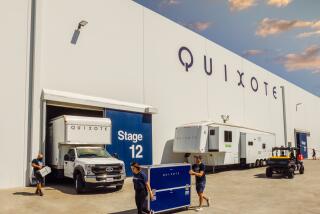Qintex Wins MGM/UA With a Sweetened Offer : Murdoch Group Believes It Was Used by Kerkorian to Squeeze Out Higher Price From Rival Bidder
- Share via
The price for MGM/UA Communications rose even higher Friday as controlling shareholder Kirk Kerkorian accepted a $1.5-billion purchase offer from Australia’s Qintex Corp. over an 11th-hour bid from two firms controlled by media mogul Rupert Murdoch.
The deal was viewed on Wall Street and in the entertainment community as yet another financial magic trick by Kerkorian, who over the years has repeatedly sold and repurchased MGM/UA assets and now was profiting handsomely from a final bidding war. But the week’s drama has sparked rancor between some of the players, with the Murdoch camp essentially accusing Kerkorian of soliciting the bid to jack up Qintex’s price.
The $25-per-share Qintex offer topped a $23.16-per-share bid made earlier this week by Murdoch and the $20-per-share price that Qintex had previously agreed to pay for MGM/UA. The latest Kerkorian agreement with Qintex seemingly ends an 18-month auction for the studio and concludes Kerkorian’s 20-year reign over MGM.
Kerkorian was not available for comment, and his lawyer wouldn’t say whether the financier had approached Murdoch or whether Murdoch had approached him about making a last-minute purchase offer. Regardless, several hard-bitten commentators in Hollywood and Wall Street concluded that Kerkorian had indeed come out on top.
“Kirk has done it again. It’s unbelievable. I don’t know how he induced Rupert to come out of the woodwork and (prompt Qintex Chairman Christopher C.) Skase into paying $5 more a share,” said one professional investor.
Qintex, the owner of an Australian television network and resort properties, is best known in Hollywood as a television programming supplier that scored a big hit last season as co-producer of the miniseries “Lonesome Dove.”
Executives at several major studios questioned whether Qintex can raise the $1.5-billion purchase price, and then raise additional operating funds, since MGM/UA’s activity has been stymied by the 18-month auction. In addition, Qintex is assuming $400 million in MGM/UA debt.
“I don’t know if (Skase) knows how tough it is to be in this business and (to obtain) the $400 million or $500 million (needed) to get back in the movie business,” declared one industry veteran.
“This company will only earn about $75 million annually,” warned another studio veteran who also estimated that MGM/UA will need $400 million in operating funds over the next 15 months.
Skase did not return a reporter’s call, but David Evans, the Qintex executive who is slated to become president and chief executive of MGM/UA, said the company has no intention of selling assets to pay for its new purchase. Evans expressed confidence in the firm’s ability to raise financing from European and Asian sources as well as its banks.
At the beginning of the week, the original Qintex deal appeared to be on track with its recent announcement of $400 million in bank financing and a closing date set for later this month.
Weren’t Ambushed
Then came news of the Murdoch bid, which smacked of predatory behavior, even by Hollywood standards. The town buzzed because Murdoch had hosted a party to introduce the Qintex chairman to Hollywood bigwigs--and then apparently tried to buy MGM/UA out from under his fellow Australian.
On Friday, however, Evans conceded that Qintex officials were not ambushed by Murdoch. Qintex was notified by MGM/UA several weeks ago that “interest was being expressed by News Corp. or Fox,” Evans said. “Who solicited the bid, I simply don’t know.”
More to Read
The biggest entertainment stories
Get our big stories about Hollywood, film, television, music, arts, culture and more right in your inbox as soon as they publish.
You may occasionally receive promotional content from the Los Angeles Times.










